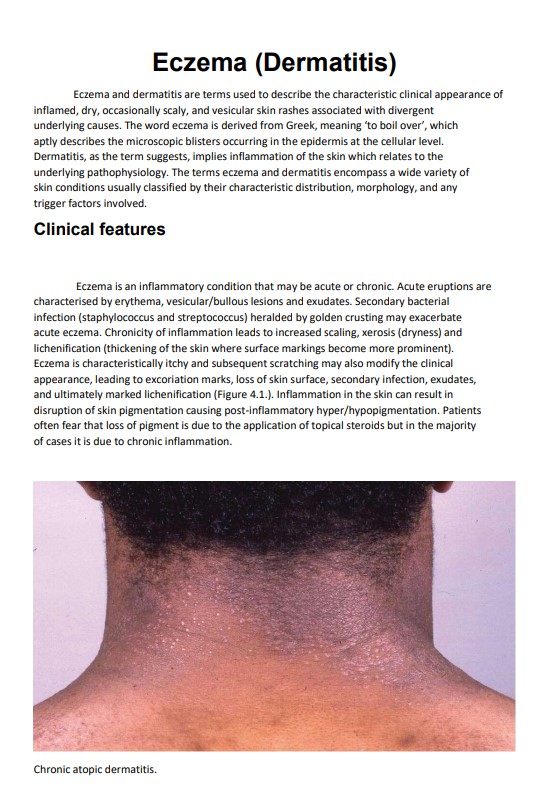Eczema (Dermatitis)
Summary:
Eczema, also known as dermatitis, is a chronic inflammatory skin condition characterized by various clinical features, pathology, and types. It is classified into endogenous (atopic dermatitis) and exogenous eczema, with the latter including contact dermatitis. Food allergies can contribute to atopic dermatitis.
Contact dermatitis, a type of exogenous eczema, is further divided into allergic and irritant subtypes, involving different immune mechanisms. Photodermatitis and occupational dermatitis are also forms of exogenous eczema. Investigations, such as patch testing, help identify the cause of eczema.
General management of eczema includes maintaining skin hydration, avoiding triggers, and using topical treatments. Biological treatments are available for atopic dermatitis. Pruritus, or itching, is a common symptom of eczema and can occur with or without skin changes. Systemic causes of pruritus should be investigated, especially in cases with normal skin appearance. Management of pruritus involves treating the underlying cause and symptomatic relief. Pruritus ani and vulvae refer to itching in the anal and vulvar areas, respectively.
Excerpt:
Eczema (Dermatitis)
Eczema and dermatitis are terms used to describe the characteristic clinical appearance of inflamed, dry, occasionally scaly, and vesicular skin rashes associated with divergent underlying causes. The word eczema is derived from Greek, meaning ‘to boil over’, which aptly describes the microscopic blisters occurring in the epidermis at the cellular level.
Dermatitis, as the term suggests, implies inflammation of the skin, which relates to the underlying pathophysiology. The terms eczema and dermatitis encompass a wide variety of skin conditions usually classified by their characteristic distribution, morphology, and any trigger factors involved.
Clinical features
Eczema is an inflammatory condition that may be acute or chronic. Erythema, vesicular/bullous lesions and exudates characterise acute eruptions. Secondary bacterial infections (staphylococcus and streptococcus) heralded by golden crusting may exacerbate acute eczema. Chronic inflammation leads to increased scaling, xerosis (dryness) and lichenification (thickening of the skin where surface markings become more prominent).
Eczema is characteristically itchy, and subsequent scratching may also modify the clinical
appearance, leading to excoriation marks, loss of skin surface, secondary infection, exudates,
and ultimately marked lichenification.


Reviews